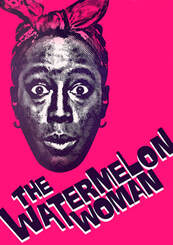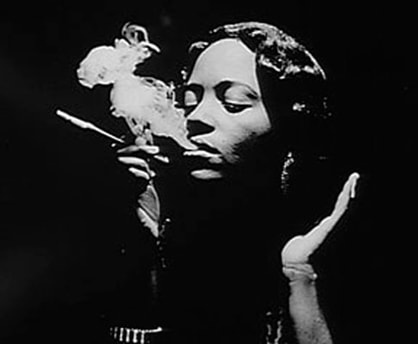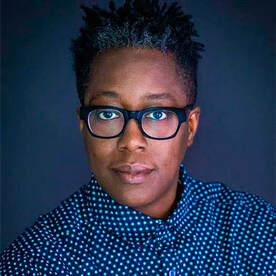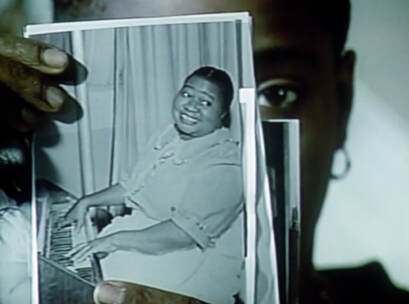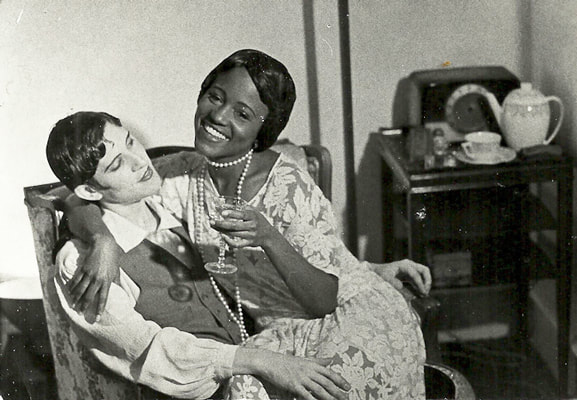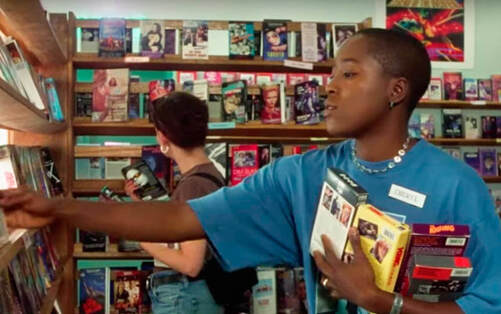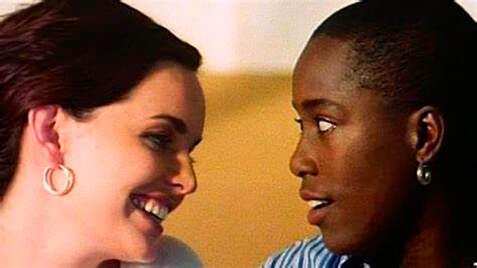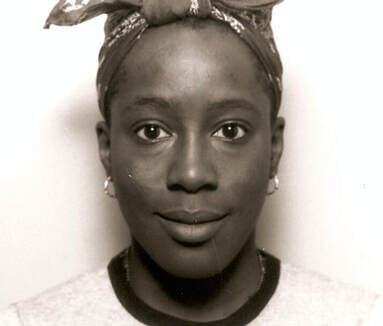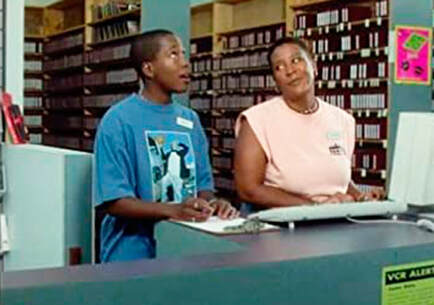The Watermelon Woman
by Paulette Reynolds * April 24, 2023
by Paulette Reynolds * April 24, 2023
The Watermelon Woman
1996
Docufiction
Director, Screenplay, Editor: Cheryl Dunye
Starring Cheryl Dunye/Cheryl, Guinevere Turner/Diana, Valarie Walker/Tamara, Lisa Marie Bronson/Fae Richards, Cheryl Clarke/June Walker, Brian Freeman/Lee Edwards, Irene Dunye/herself, Sarah Schulman/CLIT archivist, Camille Paglia/herself
1996
Docufiction
Director, Screenplay, Editor: Cheryl Dunye
Starring Cheryl Dunye/Cheryl, Guinevere Turner/Diana, Valarie Walker/Tamara, Lisa Marie Bronson/Fae Richards, Cheryl Clarke/June Walker, Brian Freeman/Lee Edwards, Irene Dunye/herself, Sarah Schulman/CLIT archivist, Camille Paglia/herself
Who is the Watermelon Woman and why is she so important to the history of cinema - especially black and queer cinema?
Cheryl: “What she means to *me* - a 25 year old black woman, means something else. It means hope. It means inspiration. It means possibility. It means history!” *1
Cheryl: “What she means to *me* - a 25 year old black woman, means something else. It means hope. It means inspiration. It means possibility. It means history!” *1
The Watermelon Woman is a 1996 independent film by Cheryl Dunye, that follows “Cheryl”, a young black woman aspiring to be a filmmaker. She’s putting together the missing fragments of Fae Richards life, a black Hollywood starlet she discovered watching the 1930s film, Plantation Memories, known only as “The Watermelon Woman”.
Cheryl: “The problem is I don't know what I want to make a film on. I know it has to be about black women; because, our stories have never been told. So, I've been renting movies for - no, I haven't been "renting" movies - but, I get movies from the video store that I work at. And I've taken all these films out from the 30s and 40s with black actresses in them. Like, Hattie McDaniel and Louise Beavers. And in these films, in some of the films, the black actresses aren't even listed in the credits. I know, I was just totally shocked by that.” *1
Along the way Cheryl’s life begins to mirror Fae’s, reflecting similar experiences of black lesbians trying to navigate love in a world that cares little for diversity, especially among women of color.
Cheryl Dunye’s docufiction faithfully recreates a cinematic story for Fae - who, like countless actors of color were never credited for their film work - or given racist signature names like Curtis McHenry’s “G. Howe Black” in the 1925 silent version of The Wizard of Oz.
Cheryl Dunye’s docufiction faithfully recreates a cinematic story for Fae - who, like countless actors of color were never credited for their film work - or given racist signature names like Curtis McHenry’s “G. Howe Black” in the 1925 silent version of The Wizard of Oz.
Cheryl: “Her name: The Watermelon Woman. That's right. Watermelon Woman. Is Watermelon Woman her first name, her last name, or is it her whole name? I don't know; but, girlfriend has it goin' on.” *1
A pioneering film that was the first full-length film directed/written/edited and starring a ‘living out loud’ lesbian. The cast brings a depth of feeling that many docufictions lack, so much so that I kept forgetting these were not real characters - especially Fae and Cheryl. Dunye shares…
“So [I made] the first African-American lesbian feature because there was none… It took a while for people to understand and accept and see all that... It's only now in retrospect where people are like, 'oh my God, that's groundbreaking.'” *2
“So [I made] the first African-American lesbian feature because there was none… It took a while for people to understand and accept and see all that... It's only now in retrospect where people are like, 'oh my God, that's groundbreaking.'” *2
The Watermelon Woman went further by exploring gender identity and acceptance in women; as Dunye peeled away the curtains obscuring another facet of Hollywood’s lackluster treatment of yet another marginalized group. Her clever use of building Fae’s false narrative also exposes the genuine lack of historical representation for black actors and black filmmakers.
The Watermelon Woman is considered a “docufiction film”, which goes beyond the genre of a found footage film, made so popular in The Blair Witch Project. Dunye’s masterpiece crafts a backstory - with a nod to Orson Welles love of pseudo-documentary (War of the Worlds) - that ‘could’ have happened, complete with interviews, photos and film shorts, about a woman who represents a very real group of actors that were segregated on screen and dismissed in cinematic history.
The Watermelon Woman is considered a “docufiction film”, which goes beyond the genre of a found footage film, made so popular in The Blair Witch Project. Dunye’s masterpiece crafts a backstory - with a nod to Orson Welles love of pseudo-documentary (War of the Worlds) - that ‘could’ have happened, complete with interviews, photos and film shorts, about a woman who represents a very real group of actors that were segregated on screen and dismissed in cinematic history.
One aspect of honoring women filmmakers in Hollywood history is a celebration of who we want to be as women and creative artists.
June Walker: “She did so much, Cheryl. That's what you have to speak about. She paved the way for kids like you to run around makin' movies about the past and how we lived then. Please, Cheryl, make our history before we are all dead and gone. But, if you are really in the family, you better understand that our family will always only have each other.” *1
June Walker: “She did so much, Cheryl. That's what you have to speak about. She paved the way for kids like you to run around makin' movies about the past and how we lived then. Please, Cheryl, make our history before we are all dead and gone. But, if you are really in the family, you better understand that our family will always only have each other.” *1
Faux character June Walker underscores the need for groups limited by the Other label, which is in itself a false construct. No one is truly constrained unless they see themselves as such, and as always, our family connections go beyond genealogy and gender, if we have the courage to celebrate it “loud and proud”.
*1 The Watermelon Woman. IMDb quotes
www.imdb.com/title/tt0118125/quotes/?ref_=tt_trv_qu
*2 Pendarvis Harshaw and Marisol Medina Cadena. "Reel Talk: Cheryl Dunye on Inventing a Film Genre". KQED.Org. March 26, 2021
www.kqed.org/arts/13894145/rightnowish-reel-talk-cheryl-dunye
www.imdb.com/title/tt0118125/quotes/?ref_=tt_trv_qu
*2 Pendarvis Harshaw and Marisol Medina Cadena. "Reel Talk: Cheryl Dunye on Inventing a Film Genre". KQED.Org. March 26, 2021
www.kqed.org/arts/13894145/rightnowish-reel-talk-cheryl-dunye
COPYRIGHT 2012/2023. Paulette Reynolds. All CineMata Movie Madness blog articles, reviews, faux interviews, commentary, and the Cine Mata character are under the sole ownership of Paulette Reynolds. All intellectual and creative rights reserved.
